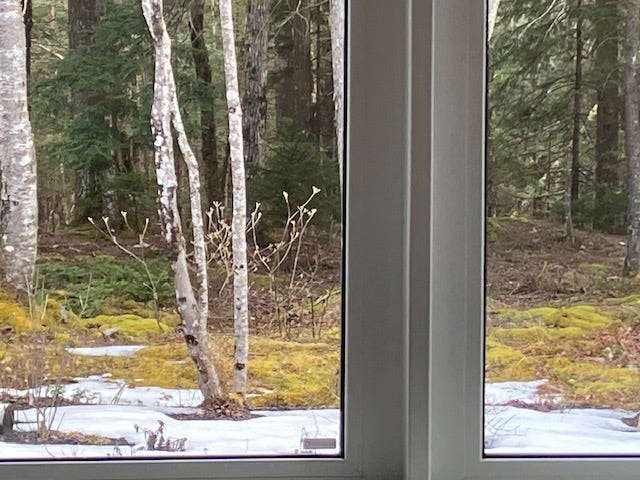Dear Reader,
This morning, the sentence fails me, as does the essay, that woven tapestry I rely on each week to bring order to the disorder of my mind. This morning a poem emerged from the part of me that is tired and splintered and searching for consolation.
Below are four poems I hope will offer a small respite from the unending news of cruelty and injustice we wake to every morning. The first one is mine. I humbly place it alongside three poems by poets I have long admired: Robert Frost, e e cummings and Edna St. Vincent Millay.
outside the windowpane
outside the windowpane the days rush the sky summersaults heels over head trees over cloud the sidewalks crumble the maps burn charred butterflies of sense scatter in the wind shadow the light rise into the silent oblivion of the universe here inside the ordered house it is early morning I drink my coffee pat my cat read the paper someone somewhere is singing like a rolling stone no direction home I am hungry I look up outside the window pane a field of yellow-green moss holds Kathleen Sullivan
These next three poets, Robert Frost, e e cummings and Edna St. Vincent Millay were writing in the time between the two great wars. They were the poets I read in that long ago time when I was young, and the world I inhabited made sense. They knew about dissolution and violence. They knew about the tension between letting go and holding on.
Nothing Gold Can Stay
1923
Robert Frost
Nature’s first green is gold,
Her hardest hue to hold.
Her early leaf’s a flower;
But only so an hour.
Then leaf subsides to leaf.
So Eden sank to grief,
So dawn goes down to day.
Nothing gold can stay.
But nothing golden stays.
next to of course god America i
1926
e e cummings
“next to of course god america i
love you land of the pilgrims’ and so forth oh
say can you see by the dawn’s early my
country ’tis of centuries come and go
and are no more what of it we should worry
in every language even deafanddumb
thy sons acclaim your glorious name by gorry
by jingo by gee by gosh by gum
why talk of beauty what could be more beaut-
iful than these heroic happy dead
who rushed like lions to the roaring slaughter
they did not stop to think they died instead
then shall the voice of liberty be mute?”
He spoke. And drank rapidly a glass of water
The Conscientious Objector
1934
Edna St. Vincent Millay
I shall die, but
that is all that I shall do for Death.
I hear him leading his horse out of the stall;
I hear the clatter on the barn-floor.
He is in haste; he has business in Cuba,
business in the Balkans, many calls to make this morning.
But I will not hold the bridle
while he clinches the girth.
And he may mount by himself:
I will not give him a leg up.
Though he flick my shoulders with his whip,
I will not tell him which way the fox ran.
With his hoof on my breast, I will not tell him where
the black boy hides in the swamp.
I shall die, but that is all that I shall do for Death;
I am not on his pay-roll.
I will not tell him the whereabout of my friends
nor of my enemies either.
Though he promise me much,
I will not map him the route to any man's door.
Am I a spy in the land of the living,
that I should deliver men to Death?
Brother, the password and the plans of our city
are safe with me; never through me Shall you be overcome.





we are in this together love
The language of poetry uses an economy of words to tell the most important stories. These wonderful poems meet the moment.❤️